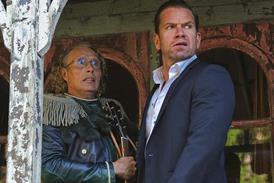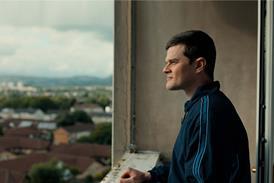Dir: Julio Medem. Spain, 2007, 120 minutes.
Many viewers felt that director Medem's The Lovers of the Arctic Circle was one of the best films of the 1990s. Its mixture of poetic visual and verbal imagery, coupled with a strong dose of mysticism and steamy insights into love and sex, seemed to be something utterly novel, heralding a major new cinematic talent. Unfortunately, things have gone down hill from there, beginning with the sexually-obsessed Sex and Lucia (2001) and now hitting rock-bottom with Chaotic Ana, Medem's first film in four years.
The swirling imagery and mysticism are still there, as well as the fascination with beautiful people having and talking about sex, but these typical Medemian elements never quite cohere around an even remotely plausible - or even very interesting - storyline.
An improbable Charlotte Rampling, speaking Spanish, runs a kind of hippie school for young artists whom she discovers on creativity forays into the Spanish countryside.
All expenses are paid for the lucky ones, who learn and get to create art all day long, and yes - since the film is relentlessly focused on women - also get to talk endlessly about boys and, when not talking, actually having sex with the grateful lads who, alas, are all cads.
One student, Ana (Velles), who has reluctantly left her doting but creative father living in his cave near the sea on Ibiza, seems to have some of the mental portals to her own creativity severely blocked.
It turns out that this is because she has lived innumerable previous lives that an American investigator called Anglo (Newman) pulls from her one by one over the course of the movie.
At first these discoveries are interesting - for example, the one connected with some Berbers from a generation ago that seem to be tied up with her handsome Moroccan boyfriend Said (Cazales), who suddenly disappears.
As Anglo painfully peels off more and more layers through hypnosis, during which Ana writhes, screams bloody murder, and speaks strange languages - and all of which is documented by a Ana's friend Linda (Bebe) on her digital camera - we go further back in time and further into silliness.
Ana sleeps with Anglo and then, in the most improbable gesture of all, ends up on Linda's father's boat in the middle of the Atlantic, as he sails to New York. It will not surprise the reader that they too have sex.
What the film has been aiming at all along, it turns out, is a breath-taking consecration of the Female Principle, embodied since pre-historic times by our very Ana, this very contemporary woman living in Spain.
Needless to say, the enemy since the beginning of time turns out to be the Bad Male Principle (as opposed to the Good Male Principle), which is responsible for all human suffering since Adam and Adam.
Medem's next leap, breathtaking in a very bad sense, is to arbitrarily link all of this to the American occupation of Iraq.
Even Americans who have long repudiated their government's involvement in this misbegotten war will be disgusted by Medem's portrait of an anonymous American government official who treats Ana like a prostitute before trying to club her to death.
It is safe to say that this single portrayal may well be enough to seriously damage any chance the filmhad of finding distribution in the US, but perhaps this very fact may make for an additional selling-point in other territories.
The actors are all gorgeous and lovely to look at - at least once the fetching Velles stops smiling so much - and the dizzying visual imagery into which Medem throws everything but the kitchen sink is often fascinating and pleasantly hallucinogenic.
But, in this story, with all its pseudo-philosophical baggage, it's ultimately more than the film, let alone the viewer, can bear.
Production
Sogecine
Alica Produce
Volcano Films
Producers
Simon de Santiago
Enrique Lopez Lavigne
Koldo Zuazua
Julio Medem
Screenplay
Julio Medem
Cinematography
Mario Montero
Editing
Julio Medem
Music
Jocelyn Pook
Manuela Velles
Bebe
Charlotte Rampling
Asier Newman
Nicolas Cazale















![[Clockwise from top left]: Paul Thomas Anderson, Chloe Zhao, Ryan Coogler, Park Chan-wook](https://d1nslcd7m2225b.cloudfront.net/Pictures/274x183/9/0/0/1467900_writerdirectors_192733.jpg)




No comments yet